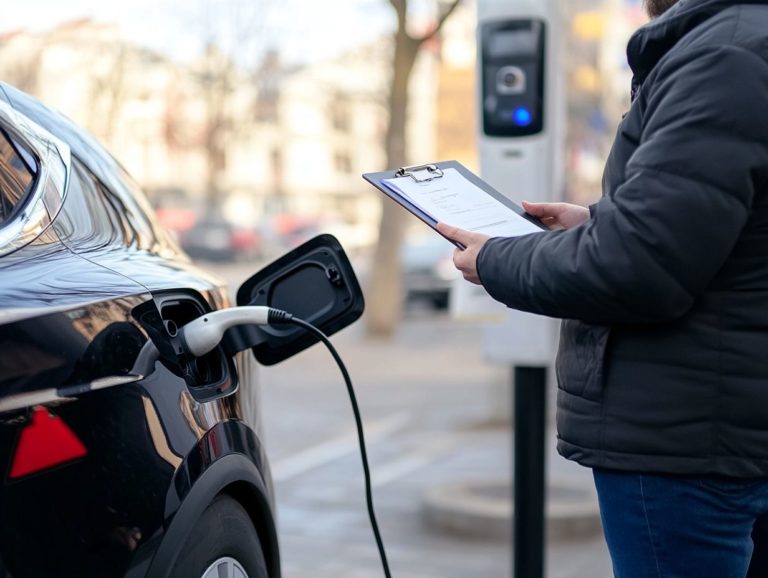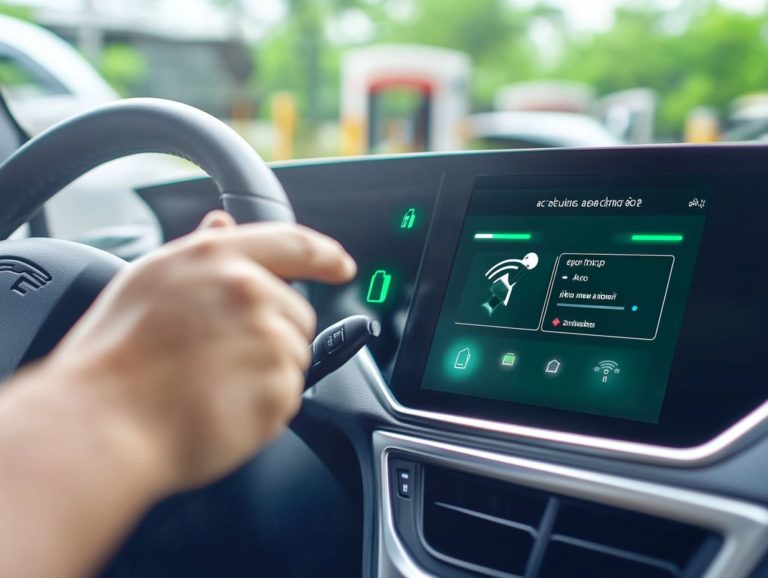how do i claim ev tax incentives?
Electric vehicles (EVs) are gaining traction, not only for their eco-friendly credentials but also due to an array of tax incentives that make them more budget-friendly.
Grasping how these incentives operate can lead to significant savings and promote more sustainable choices in your life.
This article delves into the different types of EV tax incentives available. It clarifies who qualifies, explains how to claim them, and offers strategies to maximize your savings.
It also tackles common challenges you may encounter and provides insights on how to navigate them. This ensures you re well-equipped to make the most of your EV investment.
Contents
Key Takeaways:

EV tax incentives are financial benefits provided by the government to encourage the use of electric vehicles. To be eligible, your vehicle must meet certain qualifications, and your income must fall within a specific range. Understanding electric vehicle tax incentives can help you claim these benefits by following a step-by-step guide and maximizing the advantages through tips and solutions.
Understanding EV Tax Incentives
Understanding Electric Vehicle (EV) tax incentives is essential. These credits and rebates are offered under the Inflation Reduction Act to promote the purchase of clean vehicles, including new EVs and plug-in hybrids. To learn more about how to find EV incentives in your area, you can explore various resources available.
Navigating IRS guidelines is key to unlocking your savings! It s important to understand the eligibility requirements based on vehicle specifications and your income levels.
As the appetite for electric vehicles continues to rise, so too do the chances for substantial consumer incentives. Familiarizing yourself with the program s details and requirements is a smart move if you’re ready to go green!
What are EV Tax Incentives?
EV Tax Incentives are financial perks you can take advantage of when purchasing electric vehicles. They aim to help you transition to cleaner transportation options.
These incentives come in various forms, including federal tax credits that can significantly lower the upfront cost for eligible buyers. The IRS sets the criteria for these credits, focusing on aspects such as vehicle type and battery capacity.
Many states also have their own programs to encourage the adoption of electric vehicles. They often offer rebates or tax deductions, making the switch even more appealing.
Local governments might also provide their own incentives, paving the way for environmentally conscious consumers like you to embrace electric vehicles with greater ease.
Types of Incentives Available
Several types of EV tax incentives are available, ranging from tax credits that can reduce your tax bill to commercial clean vehicle credits designed for businesses investing in electric fleets.
These incentives can significantly ease the financial burden of purchasing electric vehicles, providing a wealth of benefits through federal and state programs.
You might qualify for substantial rebates, while your business could tap into grants aimed at enhancing sustainability efforts.
Tax credits vary based on the type of vehicle and its intended use. This highlights the importance of understanding the specific applicability of each incentive.
By exploring these options, both you and your business can maximize savings while contributing to a greener environment.
Eligibility for EV Tax Incentives
Eligibility for EV tax incentives depends on key factors like the type of vehicle, its specifications, and your income level. Check the IRS and Department of Energy guidelines to ensure you qualify.
Qualifying Vehicles

To qualify for EV tax incentives, your vehicle must be a qualified model assembled in the U.S. Ensure that it meets the specific criteria established by the IRS.
Pay attention to battery capacity as well; there s typically a minimum threshold required to guarantee adequate performance and range. Emissions standards are another key factor eligible vehicles must comply with certain environmental regulations to help reduce their carbon footprint.
Take popular models like the Tesla Model 3 and Ford Mustang Mach-E, for instance. These vehicles showcase advanced battery technology and low emissions, making them excellent examples of qualifying options.
To confirm your vehicle’s eligibility, check the IRS website or the manufacturer s specifications, which detail assembly locations and battery information. This will ensure you can fully leverage these tax incentives.
Income Requirements
Income requirements are crucial in determining your eligibility for the clean vehicle tax credit. Specific income limits ensure that these incentives truly benefit consumers who need them the most.
These thresholds create a distinct line between those with higher incomes and lower-income households. If your income surpasses the set limit, you may find yourself ineligible for the benefits aimed at promoting greener vehicle choices.
For those with higher incomes, this could mean missing out on significant financial incentives designed to facilitate the transition to electric vehicles. Conversely, lower-income families stand to gain valuable support, helping to offset the costs associated with adopting cleaner, more sustainable transportation options.
Tax-exempt entities, like certain nonprofit organizations, encounter their own unique qualifications, often with different income considerations. This underscores the importance of understanding eligibility guidelines accurately across various situations.
How to Claim EV Tax Incentives
Ready to claim your EV tax incentives? Here’s how to navigate the application process. This generally means submitting the appropriate forms and ensuring that all vehicle specifications comply with IRS guidelines during your 2023 tax return. For more details on how to qualify for federal EV tax credits, be sure to check the official guidelines.
Step-by-Step Guide
Claiming EV tax incentives requires careful steps, starting with a solid understanding of what you should know about EV tax credits. Gather all necessary documentation and accurately complete the required forms for your 2024 tax return.
Navigating this process is essential to ensure your claim is successful and fully compliant with regulations. Thoroughly review the credit eligibility requirements, as these can significantly impact the incentive amount you qualify for.
Obtaining a vehicle history report is also crucial; it sheds light on the vehicle’s past, which could affect the validity of your claim. By diligently following each step and maintaining detailed records, you can streamline your experience and maximize the benefits from the incentive program.
Maximizing EV Tax Incentives
To maximize EV tax incentives, engage in strategic planning and be acutely aware of the consumer incentives available to you.
This involves conducting thorough research into money-saving options that align with your unique needs.
Tips for Getting the Most Out of Incentives

To truly capitalize on EV incentives, consider a few key strategies. Start by familiarizing yourself with clean vehicle tax credits and delve into energy credits online for additional financial support.
Research local incentives that can complement federal credits. Different states and municipalities offer unique benefits designed to encourage electric vehicle adoption, significantly enhancing your savings.
Seeking guidance from tax professionals can provide invaluable insights, helping you maximize eligible credits and navigate the complexities of tax filings with ease.
Timing your purchases wisely can lead to big savings don t miss out! Aligning your buy with the end of the fiscal year or specific promotional periods can be very beneficial.
By fully leveraging these commercial vehicle credits, you not only reduce your upfront costs but also play a part in fostering a greener environment and supporting sustainable transportation initiatives.
Potential Challenges and Solutions
Navigating EV tax incentives can be tricky. Understanding how to keep track of your EV tax credits and knowing what documents to submit is essential.
Common Issues with Claiming Incentives
Many people face problems when claiming EV tax incentives. Misunderstandings about what qualifies and IRS guidelines often lead to confusion, making it important to explore understanding the tax benefits for EV owners.
You might struggle with incorrect documentation. This can cause frustrating delays or even rejection of your claims.
Another common issue is exceeding income limits, which can disqualify you from potential savings.
Many aren’t clear about what an eligible electric vehicle is. This can make it hard to know if you qualify.
It’s essential for you to understand the requirements set by the IRS. Consult a tax professional or reliable resources to boost your chances of success. Don t miss out on these valuable incentives!
Frequently Asked Questions
Can I claim EV tax incentives?
Yes, you can claim these incentives if you meet the government s requirements.
What are the requirements to qualify for EV tax incentives?

Requirements vary by state or country. Generally, you must have purchased or leased an eligible EV for personal or business use.
How can I know if my EV qualifies?
Check the list on the government s official website or consult a tax expert.
When can I claim tax incentives for my EV?
The timing varies by location. You typically claim them when filing your annual tax return.
What documents are needed to claim EV tax incentives?
You ll need proof of purchase or lease, a copy of your vehicle registration, and proof of EV ownership.
Is there a limit on how much I can claim?
Yes, there is usually a limit based on your location and the type of EV you ve purchased or leased.






